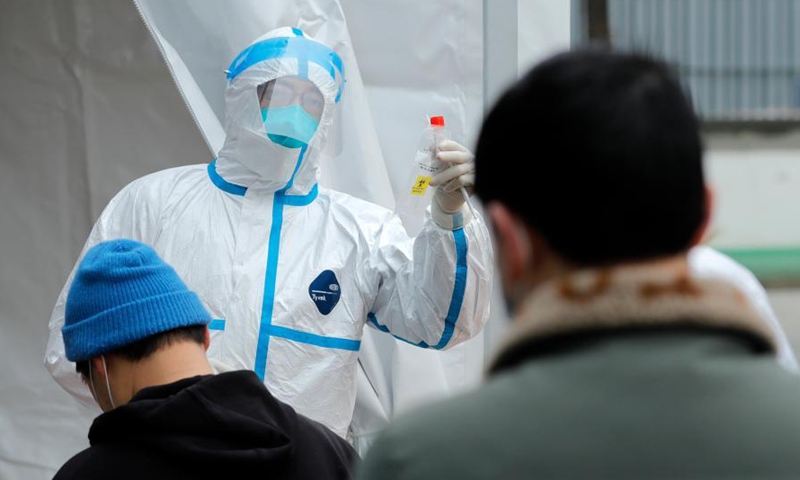COVID-19 rebounds in 4 Chinese cities, massive testing rolled out
By Liu Caiyu and Xu Yelu Source: Global Times Published: 2020/12/13 19:52:41

A medical staff member informs residents of the dos and don'ts for COVID-19 tests at the Pidu District Hospital of Traditional Chinese Medicine in Pidu District of Chengdu, capital of southwest China's Sichuan Province, Dec. 10, 2020. Chengdu reported zero increase in new domestically transmitted COVID-19 cases and asymptomatic cases from 9 p.m. Tuesday to 6 p.m. Wednesday, while citywide nucleic acid tests are continuing, local authorities said. At the Pidu District Hospital of Traditional Chinese Medicine, medical workers have been working 24 hours nonstop to conduct COVID-19 tests as quickly as possible. (Xinhua/Shen Bohan)
COVID-19 outbreaks with unknown sources of infection are taking place in at least four Chinese cities - Dongning and Suifenhe in Northeast China's Heilongjiang Province, Turpan in Northwest China's Xinjiang Uygur Autonomous Region, and Chengdu in Southwest China's Sichuan Province. To fight the virus, the cities have all rolled out massive nucleic acid testing programs and three have entered quasi-lockdown mode.
These sporadic cases are prompting China to enter a period of "epidemic normality," experts said on Sunday, noting that quasi-lockdown mode and massive nucleic acid testing could be launched in more cities this winter.
A medical expert warned that if local health authorities fail to find the sources of infection in a timely way when sporadic cases emerge, an epidemic on a scale equivalent to the earlier one in Wuhan, Central China's Hubei Province is possible.
On Sunday, Suifenhe and Dongning — both of which border Russia — entered a "wartime" mode, with reports of three confirmed cases and one case, respectively. The province had reported a total of eight domestic infections as of press time.
The same scenario was seen in Turpan, Xinjiang, which reported four new asymptomatic cases in one day on Sunday. Locals are not allowed to leave the city and neighborhoods are sealed off, the Global Times learned. Media reports said the travel ban will last one week.
At the same time, Chengdu, a city also in "wartime" mode, reported one confirmed case on Sunday, that of a previous asymptomatic patient in quarantine. The city found a total of 12 positive cases during a citywide nucleic acid testing covering more than 2.29 million people as of Saturday afternoon. The city did not declare a lockdown, but neighborhoods of high risk are sealed off.
Wang Guangfa, a respiratory expert at Peking University First Hospital, told the Global Times on Sunday that "it is not surprising to see COVID-19 cases in China. The country has entered a 'normality' where sporadic cases will occur often, given the low temperatures in winter and risks brought by imported cases and goods."
"Normality" doesn't mean zero risk and any epidemic spread could be contained 100 percent, Wang said, stressing the importance of identifying the source of infection in a timely manner and holding an epidemiological investigation.
"In principle, local authorities could handle sporadic cases. But if they fail to find the source of infection quickly, an epidemic on a scale equivalent to the earlier one in Wuhan is possible," Wang said.
Quasi-lockdowns and massive testing, the two major methods to curb the epidemic and identify sources of infections, will be frequently seen in more cities this winter, but an absolute city lockdown with everything at a standstill, like the situation in Wuhan is unlikely, Zhang Yuexin, a member of Xinjiang's anti-epidemic group, told the Global Times on Sunday.
The two border cities in Heilongjinag did not announce an official lockdown but they entered a quasi-lockdown mode, where local neighborhoods were sealed off, outbound roads were closed, public transportation was suspended and classes in schools and kindergartens were stopped. Amusement venues were also closed.
If local residents really need to go out of town, they must present a negative nucleic acid test certificate obtained within 24 hours and a residence certificate issued by the community. While residents stay at home in Suifenhe, they are able to purchase daily goods every three days and Dongning allows only one family member to go shopping outside the neighborhood every two days.
On Saturday, Turpan reported a 32-year-old employee of a trading company and later three of his close contacts - his wife, mother and a colleague - tested positive. The first patient was discovered in a regular routine nucleic acid testingof key populations.
A local resident in Turpan's Gaochang district confirmed with the Global Times on Sunday that the community where the confirmed cases had lived has been locked down. Public transportation has been stopped.
Turpan is rolling out citywide nucleic acid tests to screen for more potential infections, some locals said. The Global Times learned that routine nucleic acid tests have never stopped in Xinjiang since the previous Kashi outbreak. The requirements for each county are different. Some have gone through the third or even the seventh round of testing.
Cities that have no epidemic cases should not ease their consciousness of fighting the virus, experts warned. Wearing masks and keeping a certain social distance is a must, they said.
Chinese academician Li Lanjuan said at a forum on Sunday that imported COVID-19 cases and also the rebound of domestic cases should be given great importance in response to "epidemic normality" in winter, and warned of risks brought by imported cases as well as cold-chain food from abroad.
RELATED ARTICLES:
Posted in: SOCIETY